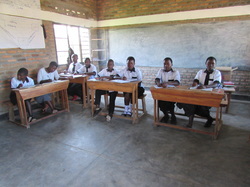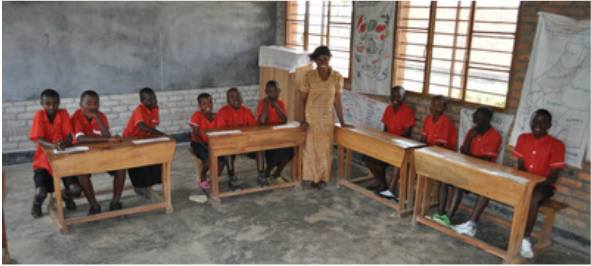 The new Senior 1 Class with both Deaf and Hearing pupils. They look smart in their new uniform, made by the girls in the sewing room.
The new Senior 1 Class with both Deaf and Hearing pupils. They look smart in their new uniform, made by the girls in the sewing room.
Our Beginnings
In 2003, KAMANA Elevanie returned to Rwanda from the Congo, where she had been cared for by her Deaf Uncle and Aunt since her parents were killed in the 1994 Genocide. Here she met and married Dominique. He became enthusiastic about her idea of setting up a school for deaf children in the Umutara area, as there was no such provision in the area. He established the charity, Friends of Handicap with the idea of creating a residential centre for Deaf children in Umutara, in the Eastern Province of Rwanda. The centre has the aim to develop advocacy, wellbeing, education and vocational training for deaf children and young adults. The school started with 15 children, living in two old buildings with no running water or electricity. It has now grown to be able to cater for up to 110 children in a growing centre in the rural Sector of Gatunda.
Our Children
The children come mainly from the Eastern Province of Rwanda, and are aged between 7 and 22. Some of the older children are enrolled in the vocational training projects, with the aim of teaching them skills which will enable them to earn a living when they return to their communities. All of the children are Deaf, most of them severely or profoundly Deaf, apart from a few exceptions where the children have communication difficulties. The main mode of communication is Rwandan Sign language.
Our Staff
Our Staff are dedicated and caring men and women who want to help these marginalised pupils. However, like many of the Primary School teachers in Rwanda, they have not received any formal training in teaching, and rely on help from NGO's to improve their knowledge of teaching techniques especially in the area of Deaf Education. At present, we have a Qualified Teacher of the Deaf from England provided by VSO (Voluntary Services Overseas) who is involved with training and mentoring our staff.
Our School
This academic year, (January 2015) we started our first Senior 1 Class, with the Deaf children who have progressing from P6 but also opening the door to local Hearing children . This is an exciting new development which is encouraged by the Government's Inclusion policy for children with a disability. Now have a Senior 2 class too. (Feb 2016) and next year we plan to expand to Senior 3. Immense thanks to the charity A Better World, for funding the building of three new classrooms, to make this dream of an Inclusive Senior department come true. The teachers of the Senior class teach in both sign language and speech.
The vocational training covers basket making, sewing using the sewing machines, knitting using the knitting machine, jewellery making, and furniture making and repairs. The woodwork project for the older children is also an inclusive programme with hearing youth from the community enrolled alongside our deaf young people. This is an exciting venture, and we love to see the hearing youth 'chatting' in sign language to their deaf colleagues.
As well as the classrooms, the buildings on the school site consist of two dormitories, one for the boys and one for the girls, with separate bathroom facilities for each, as well as a food hall, a meeting room, kitchen, administration offices and store rooms. Two members of staff are on site at all times, and their room is also on the compound.
Our school also has several cows producing milk, as well as a new chicken house with 30 chickens. There is also some land around where we grow a variety of plants, beans, tomatoes and pineapples to mention just a few.
We have good links with the local community too. Our meeting room is used on a regular basis by the Sector Office for meetings, and the Vocational Carpentry group not only has our young Deaf teenagers, but also some young people from the local area who have not been to school and want to learn a vocational skill. The young people get to know each other well. The hearing youth are learning sign language and they enjoy a game of football or volleyball together at lunch times and after school.
Our Future
Our hopes for the future involve the continued development of the Senior School, as well as further involvement with the local community.
We plan to further develop our vocational work, and support groups of students, both Deaf and hearing, to leave and set up their own co-operatives in their communities. We are also looking for new ways to market our products.
Our Future development will depend on continuing funds being available to support our vision.
In 2003, KAMANA Elevanie returned to Rwanda from the Congo, where she had been cared for by her Deaf Uncle and Aunt since her parents were killed in the 1994 Genocide. Here she met and married Dominique. He became enthusiastic about her idea of setting up a school for deaf children in the Umutara area, as there was no such provision in the area. He established the charity, Friends of Handicap with the idea of creating a residential centre for Deaf children in Umutara, in the Eastern Province of Rwanda. The centre has the aim to develop advocacy, wellbeing, education and vocational training for deaf children and young adults. The school started with 15 children, living in two old buildings with no running water or electricity. It has now grown to be able to cater for up to 110 children in a growing centre in the rural Sector of Gatunda.
Our Children
The children come mainly from the Eastern Province of Rwanda, and are aged between 7 and 22. Some of the older children are enrolled in the vocational training projects, with the aim of teaching them skills which will enable them to earn a living when they return to their communities. All of the children are Deaf, most of them severely or profoundly Deaf, apart from a few exceptions where the children have communication difficulties. The main mode of communication is Rwandan Sign language.
Our Staff
Our Staff are dedicated and caring men and women who want to help these marginalised pupils. However, like many of the Primary School teachers in Rwanda, they have not received any formal training in teaching, and rely on help from NGO's to improve their knowledge of teaching techniques especially in the area of Deaf Education. At present, we have a Qualified Teacher of the Deaf from England provided by VSO (Voluntary Services Overseas) who is involved with training and mentoring our staff.
Our School
This academic year, (January 2015) we started our first Senior 1 Class, with the Deaf children who have progressing from P6 but also opening the door to local Hearing children . This is an exciting new development which is encouraged by the Government's Inclusion policy for children with a disability. Now have a Senior 2 class too. (Feb 2016) and next year we plan to expand to Senior 3. Immense thanks to the charity A Better World, for funding the building of three new classrooms, to make this dream of an Inclusive Senior department come true. The teachers of the Senior class teach in both sign language and speech.
The vocational training covers basket making, sewing using the sewing machines, knitting using the knitting machine, jewellery making, and furniture making and repairs. The woodwork project for the older children is also an inclusive programme with hearing youth from the community enrolled alongside our deaf young people. This is an exciting venture, and we love to see the hearing youth 'chatting' in sign language to their deaf colleagues.
As well as the classrooms, the buildings on the school site consist of two dormitories, one for the boys and one for the girls, with separate bathroom facilities for each, as well as a food hall, a meeting room, kitchen, administration offices and store rooms. Two members of staff are on site at all times, and their room is also on the compound.
Our school also has several cows producing milk, as well as a new chicken house with 30 chickens. There is also some land around where we grow a variety of plants, beans, tomatoes and pineapples to mention just a few.
We have good links with the local community too. Our meeting room is used on a regular basis by the Sector Office for meetings, and the Vocational Carpentry group not only has our young Deaf teenagers, but also some young people from the local area who have not been to school and want to learn a vocational skill. The young people get to know each other well. The hearing youth are learning sign language and they enjoy a game of football or volleyball together at lunch times and after school.
Our Future
Our hopes for the future involve the continued development of the Senior School, as well as further involvement with the local community.
We plan to further develop our vocational work, and support groups of students, both Deaf and hearing, to leave and set up their own co-operatives in their communities. We are also looking for new ways to market our products.
Our Future development will depend on continuing funds being available to support our vision.

